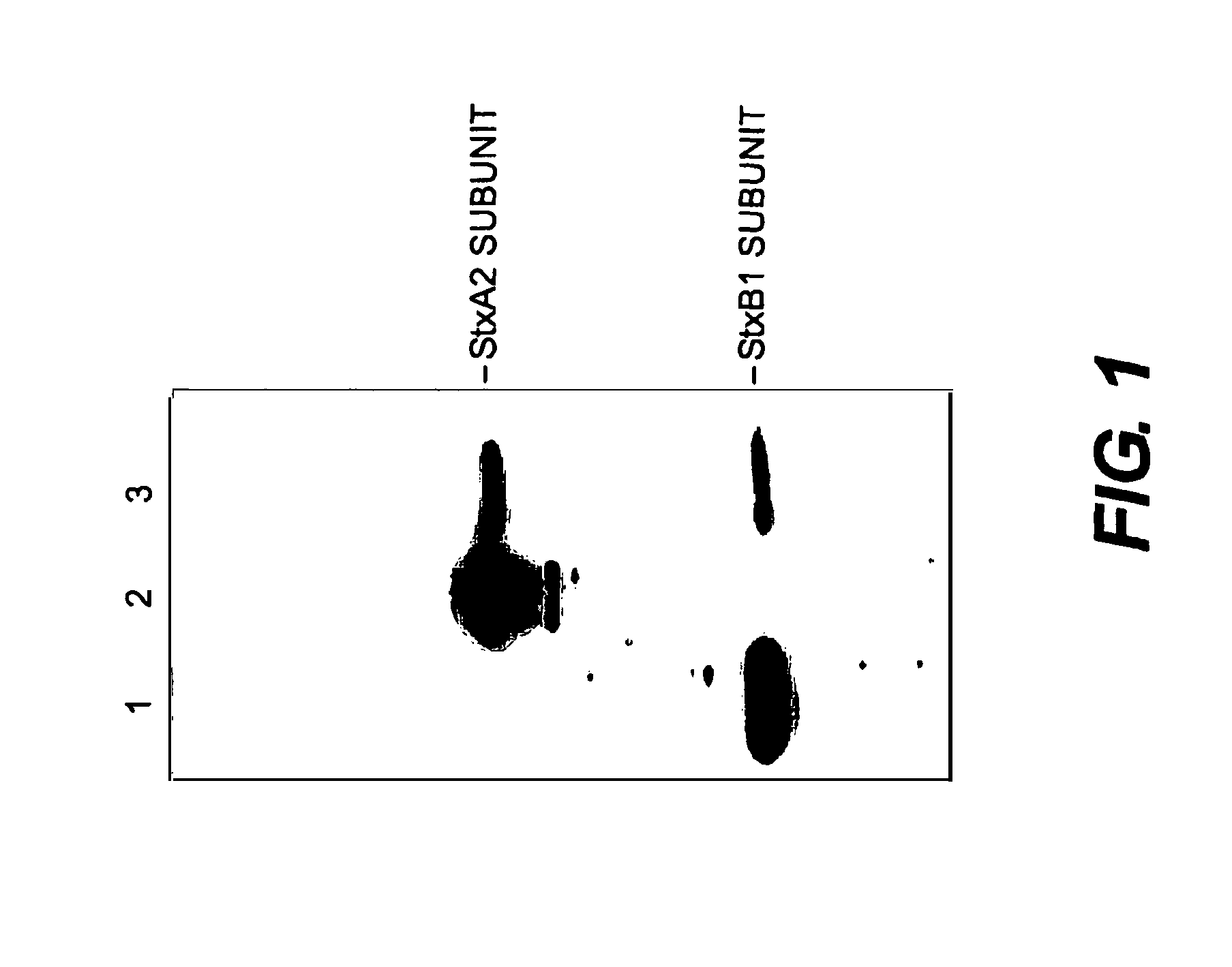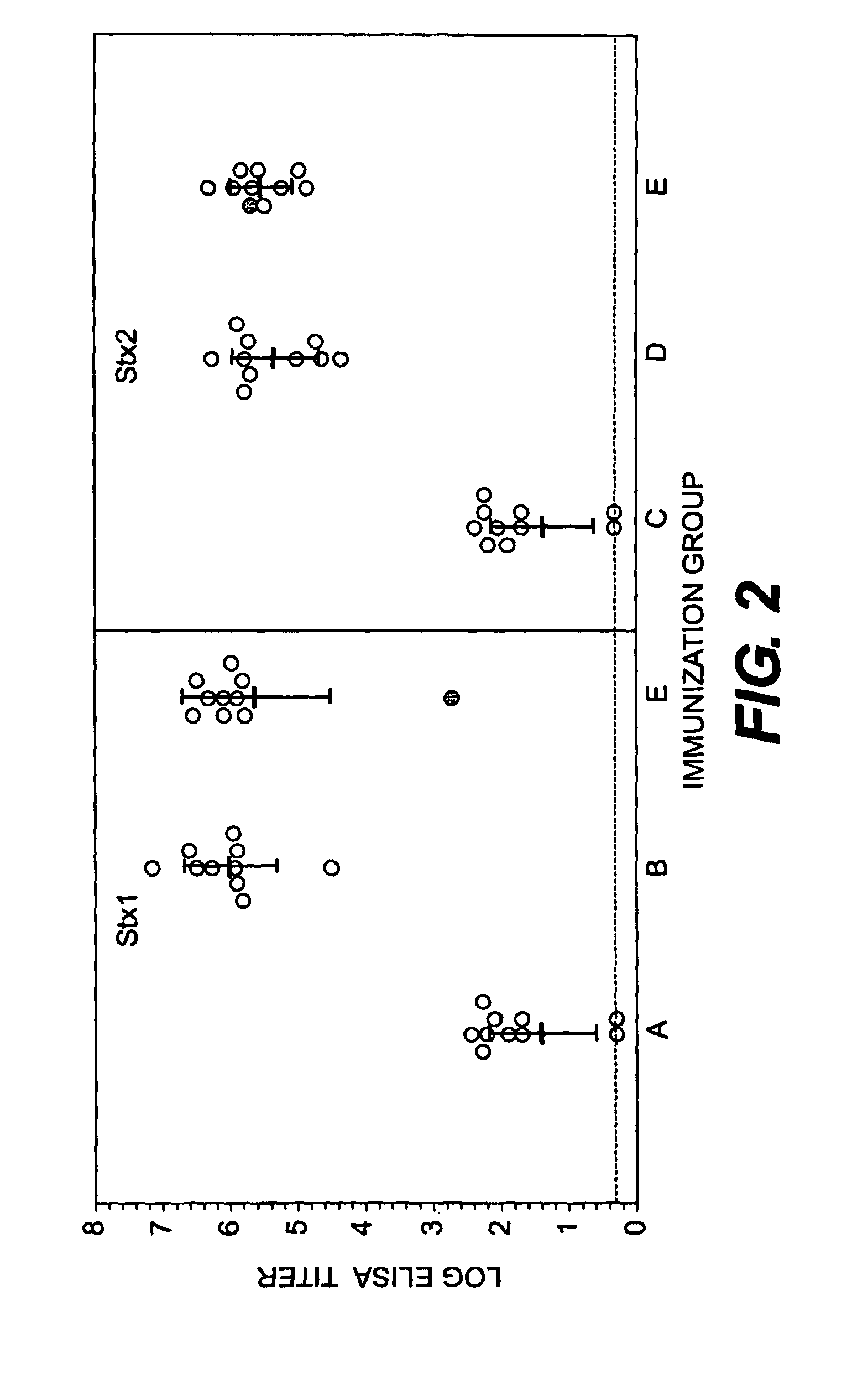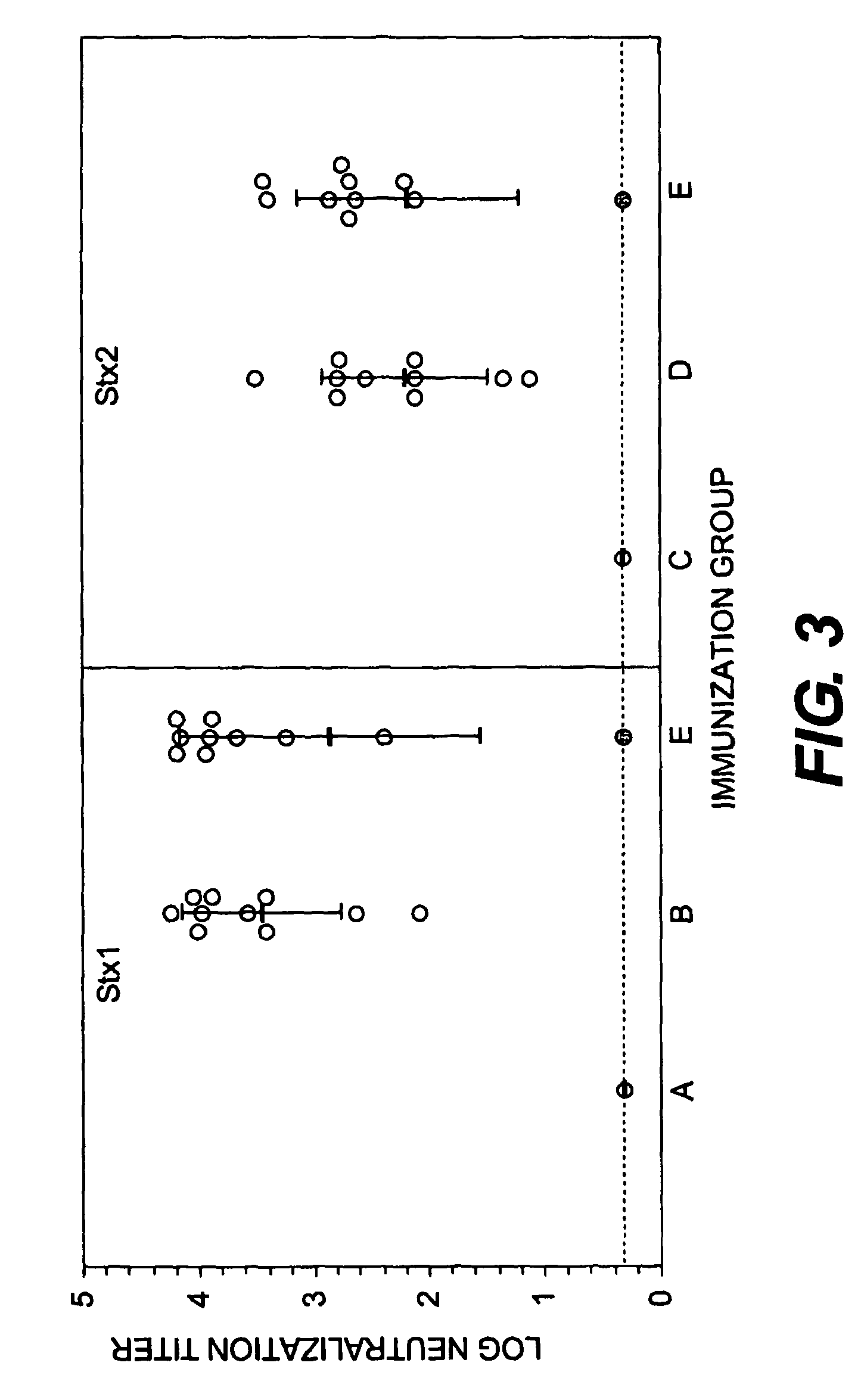Shiga toxoid chimeric proteins
a technology of chimeric proteins and shiga toxoid, which is applied in the field of chimeric shiga toxoid, can solve the problems of antibiotic treatment contraindications, no interventional therapy or vaccine is currently available, and the possibility of residual kidney and neurological damage among survivors, and achieve the effect of reducing or eliminating the enzymatic activity of stx2a polypeptides and reducing or eliminating the enzymatic activity of stx2a
- Summary
- Abstract
- Description
- Claims
- Application Information
AI Technical Summary
Benefits of technology
Problems solved by technology
Method used
Image
Examples
example 1
Construction of Chimeric stxA2 / stxB1 and Toxoid Mutations
[0084]A genetically toxoided version of Stx that could be used as a vaccine to protect against both Stx1 and Stx2 was constructed. Because the StxB1 protein is highly immunogenic and more protective than the StxB2 subunit protein (Marcato et al. (2001) J. Infect. Dis. 183, 435-43), StxB1 was used for the B subunit portion of the vaccine. StxA2 was chosen for the A subunit of the vaccine construct.
[0085]The stxA2 and stxB1 genes were spliced together to generate an operon fusion composed of stxA2 followed by the native stxB1 intergenic region that contains the ribosomal binding site for translation of StxB1, then the stxB1 gene. The holotoxoid expression cassette was designed in the native operon configuration to optimize translation and assembly of the AB5 holotoxoid.
[0086]Next, the StxA2 portion of the chimeric toxoid was modified by introducing three modifications (Y77S, E167Q, and R170L) to prevent a potential for reversion...
example 2
Purification of the StxA2 / StxB1 Toxoid
[0092]The purification of the StxA2 / StxB1 toxoid was done by Gb3 affinity purification as described previously (Ishikawa et al. (2003) Infect. Immun. 71, 3235-9; Wen et al. supra). Gb3 affinity purification is a process that captures the B subunit binding domain. An overnight culture of E. coli BL21 (DE3) that contained the pTrcHis2 C-stxA2 / stxB1 clone was diluted 1:50 into two flasks each containing 500 ml LB broth. After 2 hours of growth, the cultures were induced with 1 mM isopropyl 3-D-thiogalactopyranoside (IPTG) and incubated for an additional 4 hours.
[0093]The bacteria were pelleted by centrifugation and concentrated 50-fold by re-suspension in 10 ml of 1× phosphate-buffered saline, pH 7.4 (PBS). The concentrated bacterial suspensions were then disrupted by sonication and the resulting lysates clarified by centrifugation. The StxA2 / StxB 1 toxoid was purified from these lysates by Gb3 affinity purification on Globotriose Fractogel columns...
example 3
Cytotoxicity Assay
[0094]The cytotoxic activity for Vero cells of various samples was assessed as previously described. Briefly, E. coli DH5 transformed with toxin clones in pBluescript II KS (−) were normalized to the same optical density (O.D.)600, and the bacteria were disrupted by sonication and clarified by centrifugation. Clarified sonic lysates or purified toxoid were assessed for Vero cell cytotoxic activity (Schmitt et al. (1991) Infect. Immun. 59, 1065-73; Gentry et al. (1980) 26, 2127-31) after diluting the samples in Eagle's minimum essential medium (Cambrex BioScience) supplemented with 9% fetal bovine serum (BioSource International), 1.8 mM glutamine (Cambrex), 9 U / ml of penicillin 9 pg / ml of streptomycin (Invitrogen Corporation), and 90 μg / ml of gentamicin (Quality Biological) (complete EMEM). The 50% cytotoxic dose (CD50) of samples was defined as the reciprocal of the dilution that killed 50% of the Vero cells, as compared to the untreated control cells.
[0095]The cyt...
PUM
| Property | Measurement | Unit |
|---|---|---|
| temperature | aaaaa | aaaaa |
| ionic strength | aaaaa | aaaaa |
| diameter | aaaaa | aaaaa |
Abstract
Description
Claims
Application Information
 Login to View More
Login to View More - R&D
- Intellectual Property
- Life Sciences
- Materials
- Tech Scout
- Unparalleled Data Quality
- Higher Quality Content
- 60% Fewer Hallucinations
Browse by: Latest US Patents, China's latest patents, Technical Efficacy Thesaurus, Application Domain, Technology Topic, Popular Technical Reports.
© 2025 PatSnap. All rights reserved.Legal|Privacy policy|Modern Slavery Act Transparency Statement|Sitemap|About US| Contact US: help@patsnap.com



